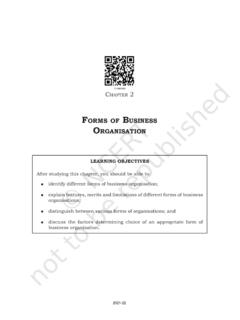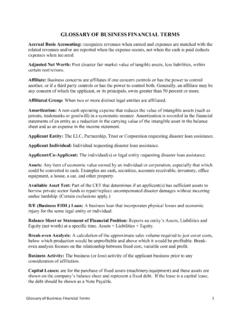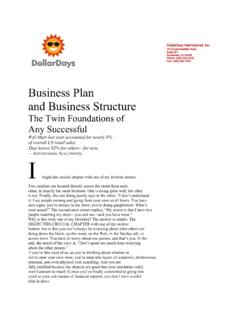Transcription of Advantages of Doing Business With Native Americans ...
1 PROPRIETARY AND CONFIDENTIAL Advantages of Doing Business with Native Americans Discussion Paper Internal Memo 1 PROPRIETARY AND CONFIDENTIAL The purpose of this paper is to review the Advantages to Doing Business with North american Indians and their businesses. General North american Indians are recognized with strong Business Advantages . These Advantages are particularly marked in relation for government and private sector contracting, and there are many savvy planning options available. Native american businesses, tribal member owned enterprises and minority companies are in demand.
2 All government contracts and most private corporations require a percentage (anywhere from 20% to 40%) of their vendor dollars to go to minority enterprises. Native american companies can play a significant role in contracting as a subcontractor, or a prime contractor. Native american owned enterprises have the unique opportunity to offer DOD prime contractors the ability to access the 5% cash contract rebates available under the Native american Incentives Act ( FAR Clause ). Native american and minority enterprises can utilize SBA socially Disadvantaged Business certification (SDB), HUBZone certification and SBA 8(a) SDB certification to break into government contracting.
3 The Unique Value of Native american Contractors Native american and tribally-owned enterprises have unique Advantages in minority contracting and can offer prime contractors solutions to minority subcontracting requirements including possible cash rebates. A Native american tribally owned enterprise can meet DOD Indian Incentives Act requirements, provide "super 8(a) status" and meet HUBZone criteria. A. THE INDIAN INCENTIVE PROGRAM DOD Under the Native american Incentive Act (25 Sec. 1544), prime contractors utilizing a Native american enterprise as a subcontractor are eligible for a 5% cash rebate of the amount paid the Native american enterprise.
4 This cash rebate is currently available under DOD contracts. The rebate is available to any prime contractor using a Native american enterprise or tribally owned company as a subcontractor at any sub-tier. For more specific information on the Indian Incentive program, see FAR Clause 52-226. 1, and DFARS Clause Internal Memo 2 PROPRIETARY AND CONFIDENTIAL B. Native american "SUPER" SBA 8(a) SDB Tribally owned 8(a) enterprises enjoy unique Advantages for minority contracting1. It is important that Native american tribes fully explore the Advantages and opportunities for economic development available to them through the SBA 8(a) SDB program for tribally-owned2 enterprises.
5 The purpose of the SBA 8(a) SDB program is to ..assist eligible small disadvantaged Business concerns compete in the american economy through Business development. Tribally owned "8(a)'s" are exempt from some of the restrictions applicable to other SBA 8(a) SDB's and can achieve what is known as "super 8(a) status" as a result of the regulatory exemptions. (In general, for SBA regulations setting out exceptions for tribal 8(a) enterprises, see 13 CFR ) Tribally owned 8(a) firms are entitled to receive sole source any contracts of any value. The $3M size standard limitations applied to other 8(a)'s do not The award of a sole source contract cannot be challenged by another Participant or any other party, either to SBA or any administrative forum as part of a bid or other contract protest (S.)
6 (a). Tribes may form and operate multiple 8(a) companies without regard to affiliation if the NAICS codes are unique to 1 13 CFR defines a Tribally-owned concern to mean any concern at least 51 percent owned by and Indian Tribe as defined in this section. 2 S. (3) reads: Ownership. (i) For corporate entities, a tribe must own at least 51 percent of the voting stock and at least 51 percent of the aggregate of all classes of stock. For non-corporate entities, a tribe must own at least a 51 percent interest. (ii) A tribe cannot own 51% or more of another firm which, either at the time of application or within the previous two years, has been operating in the 8(a) program under the same primary SIC code as the applicant.
7 A tribe may, however, own a Participant or an applicant that conducts or will conduct secondary Business in the 8(a) BD program under the same SIC code that a current Participant owned by the tribe operates in the 8(a) BD program as its primary SIC code. (iii) The restrictions of Sec. (h) [ , ownership restrictions for non-disadvantaged individuals and concerns] do not apply to tribes; they do, however, apply to non disadvantaged individuals or other Business concerns that are partial owners of a tribally-owned concern. 3 See (b) reads Exemption from competitive thresholds for Participants owned by Indian tribes. SBA may award a sole source 8(a) contract to a Participant concern owned and controlled by an Indian tribe or an ANC where the anticipated value of the procurement exceeds the applicable competitive threshold if SBA has not accepted the requirement into the 8(a) BD program as a competitive procurement.
8 There is no requirement that a procurement must be competed whenever possible before it can be accepted on a sole source basis for a tribally-owned or ANC-owned concern, but a procurement may not be removed from competition to award it to a tribally-owned or ANC-owned concern on a sole source basis. 4 See 13 CFR (5) reads Individual eligibility limitation. SBA does not deem an individual involved in the management or daily Business operations of a tribally-owned concern to have used his or her individual eligibility within the meaning of Sec. (b) [this provision essentially states that a participant can only participate in the 8(a) BD program once.]
9 ]. Internal Memo 3 PROPRIETARY AND CONFIDENTIAL The affiliation rules, applicable to size standard determinations by the SBA, do not apply to tribal 8(a) Any firm owned 51% or more by a tribe is presumed to be socially disadvantaged without formal explanation (per requirement of (b)(2)).6 (This avoids having to produce a substantial amount of evidence to prove disadvantaged status). A tribe though must show that it is economically 5 S. (2)(iii) reads In determining the size of a small Business concern owned by a socially and economically disadvantaged Indian tribe (or a wholly owned Business entity of such tribe) for either 8(a) BD program entry or contract award, the firm's size shall be determined independently without regard to its affiliation with the tribe, any entity of the tribal government, or any other Business enterprise owned by the tribe, unless the Administrator determines that one or more such tribally-owned Business concerns have obtained, or are likely to obtain, a substantial unfair competitive advantage within an industry category.
10 6 See 13 CFR or 13 CFR (b). (1) Ownership by one or more disadvantaged individuals must be direct ownership. An applicant or Participant owned principally by another Business entity or by a trust including employee stock ownership trusts) that is in turn owned and controlled by one or more disadvantaged individuals does not meet this requirement (s. (a)); (2) In the case of a concern which is a corporation, at least 51 percent of each class of voting stock outstanding and 51 percent of the aggregate of all stock outstanding must be unconditionally owned by one or more individuals determined by SBA to be socially and economically disadvantaged ( (d)); (3) s.





